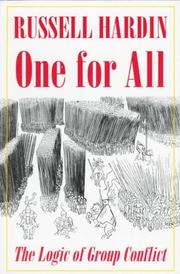| Listing 1 - 10 of 22 | << page >> |
Sort by
|

ISBN: 2130357083 9782130357087 Year: 1978 Volume: 45 Publisher: Paris : PUF - Presses Universitaires de France,
Abstract | Keywords | Export | Availability | Bookmark
 Loading...
Loading...Choose an application
- Reference Manager
- EndNote
- RefWorks (Direct export to RefWorks)
Social change --- Sociological theory building --- Social conflict --- Changement social --- Conflits sociaux --- Class conflict --- Class struggle --- Conflict, Social --- Social tensions --- Interpersonal conflict --- Social psychology --- Sociology --- Change, Social --- Cultural change --- Cultural transformation --- Societal change --- Socio-cultural change --- Social history --- Social evolution --- Sociologie

ISBN: 2708223208 9782708223202 Year: 1983 Publisher: Paris Ed. ouvrières
Abstract | Keywords | Export | Availability | Bookmark
 Loading...
Loading...Choose an application
- Reference Manager
- EndNote
- RefWorks (Direct export to RefWorks)
Political sociology --- Sociology of culture --- Violence --- Nonviolence --- Social conflict --- Prevention --- -Nonviolence --- #GGSB: Moraaltheologie (algemeen) --- #GGSB: Sociaal-economische ethiek --- #gsdb5 --- Class conflict --- Class struggle --- Conflict, Social --- Social tensions --- Interpersonal conflict --- Social psychology --- Sociology --- Non-violence --- Government, Resistance to --- Pacifism --- Violent behavior --- Moraaltheologie (algemeen) --- Sociaal-economische ethiek --- Violence - Prevention
Book
ISBN: 2130487319 9782130487319 Year: 1997 Volume: *19 Publisher: Paris Presses universitaires de France
Abstract | Keywords | Export | Availability | Bookmark
 Loading...
Loading...Choose an application
- Reference Manager
- EndNote
- RefWorks (Direct export to RefWorks)
Conflict [Interpersonal ] --- Conflict tussen mensen --- Conflit entre personnes --- Interpersonal conflict --- Conflict (Psychology) --- Conflit (Psychologie) --- Social conflict --- Conflict management --- Conflits (gestion) Conflicthantering --- Relations humaines Menselijke relaties --- Psychologie d'organisation Organisatiepsychologie --- Class conflict --- Class struggle --- Conflict, Social --- Social tensions --- Social psychology --- Sociology --- Conflict, Interpersonal --- Interpersonal relations --- Interpersonal conflict. --- Social conflict. --- phénomènes de groupe --- le conflit --- résolution du conflit --- comportements humaines


ISBN: 2738481000 9782738481009 Year: 1999 Publisher: Paris : L'Harmattan,
Abstract | Keywords | Export | Availability | Bookmark
 Loading...
Loading...Choose an application
- Reference Manager
- EndNote
- RefWorks (Direct export to RefWorks)
International movements --- International economic relations --- Political philosophy. Social philosophy --- Community organization --- economie --- mondialisering --- Globalization --- Capitalism --- Social conflict --- World Economic Forum --- Class conflict --- Class struggle --- Conflict, Social --- Social tensions --- Interpersonal conflict --- Social psychology --- Sociology --- Global cities --- Globalisation --- Internationalization --- International relations --- Anti-globalization movement --- Market economy --- Economics --- Profit --- Capital --- Capitalism. --- Globalization. --- Social conflict. --- Mondialisation --- Capitalisme --- Conflits sociaux --- World Economic Forum. --- EMF Foundation --- Sociological aspects --- globalisering --- Inégalité sociale --- Résistance au gouvernement
Book
ISSN: 11585900 ISBN: 2130473725 9782130473725 Year: 1995 Volume: *5 Publisher: Paris : PUF - Presses Universitaires de France,
Abstract | Keywords | Export | Availability | Bookmark
 Loading...
Loading...Choose an application
- Reference Manager
- EndNote
- RefWorks (Direct export to RefWorks)
Filosofie [Marxistische ] --- Marxian philosophy --- Marxism --- Marxisme --- Marxist philosophy --- Marxistische filosofie --- Philosophie marxiste --- Philosophy [Marxist ] --- Historical materialism --- Philosophy, Marxist --- Capitalism --- Ideology --- Production (Economic theory) --- Matérialisme historique --- Capitalisme --- Idéologie --- Production --- Philosophy --- Philosophie --- State, The --- Marxian economics --- Social conflict --- Administration --- Commonwealth, The --- Sovereignty --- Political science --- Class conflict --- Class struggle --- Conflict, Social --- Social tensions --- Interpersonal conflict --- Social psychology --- Sociology --- Microeconomics --- Supply and demand --- Demand (Economic theory) --- Supply-side economics --- Marxist economics --- Communism --- Schools of economics --- Socialism --- Market economy --- Economics --- Profit --- Capital --- Matérialisme historique --- Idéologie
Book
ISBN: 357904298X 9783579042985 Year: 1971 Volume: 8 Publisher: Gütersloh Mohn
Abstract | Keywords | Export | Availability | Bookmark
 Loading...
Loading...Choose an application
- Reference Manager
- EndNote
- RefWorks (Direct export to RefWorks)
241.62*2 --- Theologische ethiek: relaties binnen sociale groepen --- 241.62*2 Theologische ethiek: relaties binnen sociale groepen --- Christian sociology --- Industrial relations --- Social conflict --- Social ethics --- Ethics --- Social problems --- Sociology --- Class conflict --- Class struggle --- Conflict, Social --- Social tensions --- Interpersonal conflict --- Social psychology --- Capital and labor --- Employee-employer relations --- Employer-employee relations --- Labor and capital --- Labor-management relations --- Labor relations --- Employees --- Management --- Sociology, Christian (Lutheran) --- Lutheran Church

ISBN: 0691048258 9786612457784 140082169X 1282457780 9780691048253 Year: 1997 Publisher: Princeton, NJ : Princeton University Press,
Abstract | Keywords | Export | Availability | Bookmark
 Loading...
Loading...Choose an application
- Reference Manager
- EndNote
- RefWorks (Direct export to RefWorks)
In a book that challenges the most widely held ideas of why individuals engage in collective conflict, Russell Hardin offers a timely, crucial explanation of group action in its most destructive forms. Contrary to those observers who attribute group violence to irrationality, primordial instinct, or complex psychology, Hardin uncovers a systematic exploitation of self-interest in the underpinnings of group identification and collective violence. Using examples from Mafia vendettas to ethnic violence in places such as Bosnia and Rwanda, he describes the social and economic circumstances that set this violence into motion. Hardin explains why hatred alone does not necessarily start wars but how leaders cultivate it to mobilize their people. He also reveals the thinking behind the preemptive strikes that contribute to much of the violence between groups, identifies the dangers of "particularist" communitarianism, and argues for government structures to prevent any ethnic or other group from having too much sway. Exploring conflict between groups such as Serbs and Croats, Hutu and Tutsi, Northern Irish Catholics and Protestants, Hardin vividly illustrates the danger that arises when individual and group interests merge. In these examples, groups of people have been governed by movements that managed to reflect their members' personal interests--mainly by striving for political and economic advances at the expense of other groups and by closing themselves off from society at large. The author concludes that we make a better and safer world if we design our social institutions to facilitate individual efforts to achieve personal goals than if we concentrate on the ethnic political makeup of our respective societies.
Social groups --- Social conflict --- 316.35 --- #SBIB:327.5H20 --- 316.45 --- Association --- Group dynamics --- Groups, Social --- Associations, institutions, etc. --- Social participation --- Class conflict --- Class struggle --- Conflict, Social --- Social tensions --- Interpersonal conflict --- Social psychology --- Sociology --- Sociale groepen. Sociologie van de groep --- Vredesonderzoek: algemeen --- Sociale groepen. Groepsprocessen. Kleine groepen. Interactionele groepsdynamiek --- 316.45 Sociale groepen. Groepsprocessen. Kleine groepen. Interactionele groepsdynamiek --- 316.35 Sociale groepen. Sociologie van de groep --- Social conflict. --- Social groups -- Decision making. --- Social groups. --- Sociology & Social History --- Social Sciences --- Social Change

ISBN: 2213021074 9782213021072 Year: 1988 Publisher: Paris : Fayard,
Abstract | Keywords | Export | Availability | Bookmark
 Loading...
Loading...Choose an application
- Reference Manager
- EndNote
- RefWorks (Direct export to RefWorks)
Toutes les sociétés sont confrontées au désordre, leur ordre en est indissociable. Celles que la tradition gouverne encore se définissent elles-mêmes en termes d'équilibre, de conformité, de stabilité relative ; elles se voient comme un monde à l'endroit où le désordre peut avoir des effets négatifs et mettre toute chose à l'envers. On tente de faire de l'ordre avec du désordre, de même que le sacrifice fait de la vie avec de la mort, de la loi avec de la violence domestiquée par l'opération symbolique. Puisqu'il est irréductible, inévitable et nécessaire, la seule issue est de l'utiliser à sa propre et partielle neutralisation et de le convertir en facteur d'ordre. Il devient ainsi l'instrument d'un travail positif. La modernité, c'est le mouvement plus l'incertitude ; elle avive la conscience de désordre. Le recours à l'explication par le désordre manifeste la réalité présente en certains de ses états : il révèle la quasi impossibilité de la comprendre autrement, il relève de la logique constitutive des mythes contemporains. Une exploration interprétative, sociologique et anthropologique permet d'identifier des figures actuelles du désordre - l'événement brutal, l'épidémie et le mal, la violence et le terrorisme, le politique déforcé - et des formes de réaction à l'irruption du désordre - la réponse totale ou totalitaire, la réponse de la personne par le sacré, la réponse des pragmatiques par le mouvement. En ouverture à cet essai, une mise en perspective qui place successivement le couple ordre-désordre dans ses rapports au mythe, à la science et au savoir social. Au terme, un éloge du mouvement, afin de dissiper les craintes et de mettre en garde contre les tentatives d'exploiter la peur confuse qu'il nourrit. La pensée de ce temps, située en ce temps, conduit inévitablement à penser le mouvement.
Order --- Social history --- Demonstrations --- Ecole marxiste de sociologie --- Histoire sociale --- Manifestations --- Sociological aspects --- Aspect sociologique --- Social change --- Social conflict --- Sociologie --- Anthropologie --- 316.42 --- #SBIB:316.7C170 --- Class conflict --- Class struggle --- Conflict, Social --- Social tensions --- Interpersonal conflict --- Social psychology --- Sociology --- Change, Social --- Cultural change --- Cultural transformation --- Societal change --- Socio-cultural change --- Social evolution --- Social change. Sociale ontwikkeling. Sociale veranderingen. Modernisering. Evolutie .Sociale revolutie. Modernisme --- Cultuursociologie: culturele groei, vooruitgang, stagnatie, technologische verandering, cultuurbewegingen --- Social change. --- Social conflict. --- 316.42 Social change. Sociale ontwikkeling. Sociale veranderingen. Modernisering. Evolutie .Sociale revolutie. Modernisme --- Normes sociales --- Changement social --- Civilisation moderne --- Ordre (philosophie) --- Normes sociales. --- Changement social. --- Civilisation moderne. --- Sociologie.

ISBN: 0521421896 0521420520 0511528175 9780521421898 Year: 1992 Publisher: Cambridge : Cambridge University Press,
Abstract | Keywords | Export | Availability | Bookmark
 Loading...
Loading...Choose an application
- Reference Manager
- EndNote
- RefWorks (Direct export to RefWorks)
Many of the fundamental questions in social science entail an examination of the role played by social institutions. Why do we have so many social institutions? Why do they take one form in one society and quite different ones in others? In what ways do these institutions develop? When and why do they change? Institutions and Social Conflict addresses these questions in two ways. First it offers a thorough critique of a wide range of theories of institutional change, from the classical accounts of Smith, Hume, Marx and Weber to the contemporary approaches of evolutionary theory, the theory of social conventions and the new institutionalism. Secondly, it develops a new theory of institutional change that emphasises the distributional consequences of social institutions. The emergence of institutions is explained as a by-product of distributional conflict in which asymmetries of power in a society generate institutional solutions to conflicts.
Social institutions --- Social conflict --- Organizational sociology --- Classes [Lutte des ] --- Klassenstrijd --- Lutte des classes --- Sociale strijd --- 316.485 --- Conflictenbeheersing. Conflictregeling --- 316.485 Conflictenbeheersing. Conflictregeling --- 316.32 --- 316.42 --- 316.48 --- 316.7 --- Institutions, Social --- Class conflict --- Class struggle --- Conflict, Social --- Social tensions --- Organization (Sociology) --- Organization theory --- Sociology of organizations --- 316.48 Sociale conflicten --- Sociale conflicten --- 316.42 Social change. Sociale ontwikkeling. Sociale veranderingen. Modernisering. Evolutie .Sociale revolutie. Modernisme --- Social change. Sociale ontwikkeling. Sociale veranderingen. Modernisering. Evolutie .Sociale revolutie. Modernisme --- 316.32 Globale samenlevingsvormen --- Globale samenlevingsvormen --- 316.7 Cultuursociologie --(algemeen) --- Cultuursociologie --(algemeen) --- Social systems --- Sociology --- Social structure --- Interpersonal conflict --- Social psychology --- Bureaucracy --- Sociological theories --- Organizational sociology. --- Social conflict. --- Social institutions. --- Social Sciences --- Political Science
Book
ISBN: 2707105910 9782707105912 Year: 1972 Volume: 149 Publisher: Paris : François Maspero,
Abstract | Keywords | Export | Availability | Bookmark
 Loading...
Loading...Choose an application
- Reference Manager
- EndNote
- RefWorks (Direct export to RefWorks)
Bibliotheek François Vercammen
urban sociology --- urban management --- stadsvernieuwing --- sociale conflicten --- Mouvement social --- Urban renewal. --- Cities and towns --- Social conflict --- Urban renewal --- Model cities --- Renewal, Urban --- Urban redevelopment --- Urban renewal projects --- City planning --- Land use, Urban --- Urban policy --- Class conflict --- Class struggle --- Conflict, Social --- Social tensions --- Interpersonal conflict --- Social psychology --- Sociology --- Global cities --- Municipalities --- Towns --- Urban areas --- Urban systems --- Human settlements --- Sociology, Urban --- Environmental planning --- comprehensive plans [reports] --- Politique urbaine --- Sociologie urbaine --- Chili --- Paris (France) --- Cities and towns. --- Social conflict. --- Villes --- Conflits sociaux --- Rénovation urbaine --- Social change --- Social change. --- City planning. --- Bargaining
| Listing 1 - 10 of 22 | << page >> |
Sort by
|

 Search
Search Feedback
Feedback About
About Help
Help News
News